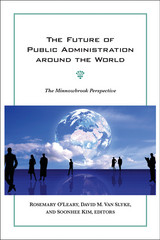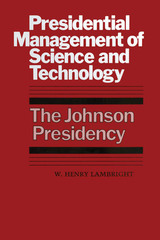
A once-in-a-generation event held every twenty years, the Minnowbrook conference brings together the top scholars in public administration and public management to reflect on the state of the field and its future. This unique volume brings together a group of distinguished authors—both seasoned and new—for a rare critical examination of the field of public administration yesterday, today, and tomorrow.
The book begins by examining the ideas of previous Minnowbrook conferences, such as relevance and change, which are reflective of the 1960s and 1980s. It then moves beyond old Minnowbrook concepts to focus on public administration challenges of the future: globalism, twenty-first century collaborative governance, the role of information technology in governance, deliberative democracy and public participation, the organization of the future, and teaching the next generation of leaders. The book ends by coming full circle to examine the current challenge of remaining relevant. There is no other book like this—nor is there ever likely to be another—in print. Simply put, the ideas, concepts, and spirit of Minnowbrook are one-of-a-kind. This book captures the soul of public administration past, present, and future, and is a must-read for anyone serious about the theory and practice of public administration.

How do science and technology issues become important to a particular presidency? Which issues gain priority? How? Why? What is the role of the presidency in the adoption of national policies affecting science and technology? In their implementation? How does the presidency try to curtail certain programs? Eliminate others? Or rescue programs Congress might seek to terminate? How does implementation vary between a president's own program and one that is inherited?
Such are the questions raised in this book, one of the first to address the relationship between scientists, few of whom have political backgrounds, and presidents, few of whom are knowledgeable in matters of science and technology. Drawing on extensive research performed at the Lyndon B. Johnson Library in Austin, Texas, and the National Archives in Washington, as well as on secondary sources and interviews, W. Henry Lambright describes, discusses, and analyzes this relationship and shows how one presidency set its agenda, adopted, implemented, and curtailed or eliminated science and technology programs.
Twenty-four case studies of specific decision processes occurring in the era of Lyndon Johnson anchor the book in the world of real events. Some programs adopted under Johnson are now all but forgotten, such as the Manned Orbiting Laboratory, nuclear desalting, and electronic barrier. The effects of many more, initiated, maintained, or enlarged under LBJ, lasted far beyond his administration. These include environmental pollution control, Project Apollo, and the application of Agent Orange in Vietnam. Finally, there are those that were redirected, placed on hold, or terminated under Johnson, such as the supersonic transport, antiballistic missile, and Project Mohole.
In this important book, Lambright has provided a framework for analyzing how the presidency as an institution deals with such issues, and he has established a strong foundation on which all future students of presidential policy management can build.
READERS
Browse our collection.
PUBLISHERS
See BiblioVault's publisher services.
STUDENT SERVICES
Files for college accessibility offices.
UChicago Accessibility Resources
home | accessibility | search | about | contact us
BiblioVault ® 2001 - 2024
The University of Chicago Press









